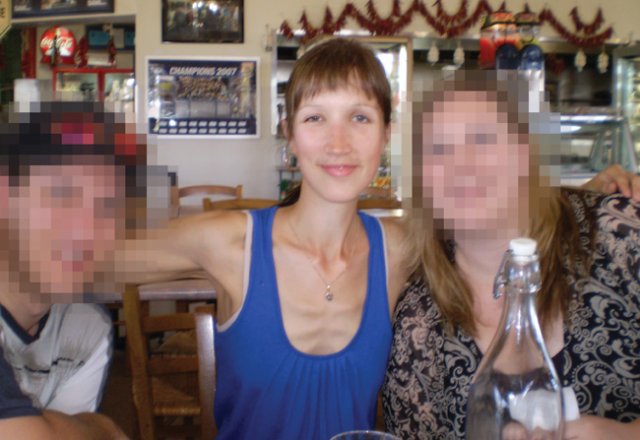
What is anorexia?

A former sufferer attempts to debunk the myths
It is estimated that eating disorders affect nearly one million Australians and approximately one in 100 adolescent girls develop anorexia nervosa.
It’s a debilitating and misunderstood disease and no one really understands its origins or the psychological effect it has on the sufferer. Lauren H (pictured) was a sufferer of anorexia nervosa and here she bravely shares her story…
We all have some awareness of the horrific physical issues that develop with anorexia nervosa, but the effects on the brain were far more punishing and terrifying for me.
Ruminating thoughts of self-criticism, feeling terrified of what people thought of me and abusing the hell out of myself if I made even the slightest mistake were all a part of this self-punishment. If something bad happened to me, it was my fault: ‘I’m too boring for the job, I’m too ugly to keep a boyfriend, even though I ate perfectly all week I ate one piece of chocolate last night so I am a lazy, disgusting person with no willpower’. The list goes on.
There were no shades of grey, as everything is black or white and extreme when living with anorexia, and the easiest punishment for myself was to administer food restriction or increase my exercise regimen.
Self loathing
Interestingly, whenever something went well for me, I would never take credit for it. It was always because I ‘got lucky’ or ‘fooled someone into liking me’, and that they made a mistake by choosing me, etc.
An insidious part of the sabotage was to screw myself out of anything I actually wanted. I allowed myself to eat something that I really liked, I would still destroy all the flavour by drowning it in a condiment or deliberately burning it. Living with anorexia is like having a spiteful, manipulative enemy accompanying you everywhere you go, one who reminds you of how useless, worthless, pathetic and disgusting you are. Those ‘well-meaning’ people that tell you to ‘just eat’ don’t understand the punishment that this voice gives you when you do.
As my weight dropped lower and lower, my body became more tired with inability to fight the voice and override its demands. For me, this was the reason that my physical state would decline so rapidly once below a certain critical point.
Mentally sick
Having said that, not everyone is at their sickest, mentally, when at their lowest physical weight. One of my friends was clearly at her absolute sickest, mentally, even though physically within a healthy weight range. For myself, in one hospital admission, even though presenting at the same weight as a previous admission (an admission in which I was able to have a positive outcome), mentally I was a nightmare! I had no concentration or short-term memory and I couldn’t even converse in a meaningful way; I instead spoke in repetitive loops. I was unable to engage in therapy, incapable of following instructions or adhering to rules and I was incapable of overriding my instincts to do things (things which made no sense, i.e. escaping the treatment facility, running into the middle of the road with no shoes on, etc).
Things became so bad for me mentally that I was actually ‘recommended’ and made an involuntary patient for my own safety, as I had become a massive risk to myself (thinking about that now is just so upsetting and terrifying, that that disease took my brain from me!). I spoke to my sister recently about that terrible period and she said that the family honestly thought I’d suffered some sort of permanent brain damage from my prolonged food restriction.
Knowing what it felt like to carry that voice and disease around with me for half of my life, it upsets me that people still think anorexia is ‘just a diet’, ‘just a phase’, ‘a disease for people who want attention, etc. Anorexia nervosa is a very serious mental illness that carries with it dramatic physical effects and catastrophic mental and emotional distress. Suicide rates are high among sufferers of the illness and it has high comorbidity with other mental illnesses such as depression and anxiety disorders. Many sufferers of anorexia are in denial that they even have a problem, let alone a serious illness, which can make compliance with treatment difficult.
When I was anorexic, I could never waste my precious time watching a movie or sitting and having a meal with a friend. I was a machine and was always walking, exercising, doing housework, shopping (anything that kept me busy), and every night something was scheduled as I didn’t want anyone to think that I was lazy or boring. It was a truly miserable and exhausting existence that not only wore me out but exhausted those around me. Even while in hospital, I studied every second that I wasn’t eating or attending group sessions.
One of the most common things I heard during my treatment for anorexia (often from my own mouth), was that you want to get better but you don’t want to gain the weight…it simply cannot work like that. As long as your body is underweight, it will think about food, it will be preoccupied and unable to fight against the eating disorder ‘voice’. Although it can feel devastating initially, to gain that weight and allow that voice to let go, the reality is that you are more able to think effectively, concentrate, engage in treatment and employ helpful strategies. My relapses resulted in having to go through the re-feeding process several times and every time, without fail, my energy, personality and brainpower improved with the weight gain. Anorexia is an illness that proves that body and mind are so inextricably linked.
Anorexics should be encouraged to practise mindfulness and being present and empowered to make their own decisions. Meditation helped me greatly as did yoga and journalling during my treatment phase, as all involve engaging in the present and with yourself. It is very important that we learn to make time for ourselves and for self-reflection.
Everyone’s journey with anorexia is different (I am referring directly to anorexia here because it is what I went through and what I understand) but I can give parents, carers and friends some advice on things that definitely do not help a sufferer in their journey. Diminishing someone’s experience of a situation does not make it easier for them to fight it; rather it makes their problem seem invalid. I had many ‘helpful’ people point out to me that it was ‘just food’ and ‘imagine those poor people in Africa who have no food’; trust me, that will never make anyone feel better. Another frustrating favourite of mine was ‘It’s just a phase you’re going through, you’ll grow out of it’. Wrong! Also encouraging an anorexic to hide their thinness beneath layers and lie about how they’re really feeling just exacerbates the feelings of guilt and secrecy.
Is society to blame?
From personal experience, I think the way mothers speak in front of their daughters is very concerning. It is one thing to see messages in magazines or on TV, but from a very young age our parents’ views and beliefs are pivotal in the formation of our own. Too many little girls have or are growing up with mothers who are constantly talking about their disgust for their own body, what they wish they could change, or how it’s not good enough.
Women should pull their heads in and be nice to each other and look after each other. We have enough to worry about in our lives without ripping each other apart with our own insecurities. At university and in social situations I get so frustrated at some of the stupid diets the girls go on and when people say things like ‘I wish I could just get anorexia and lose some weight.’ It infuriates me!
Celebrity trends and social media are contributing factors to all these issues, but we should be embracing our bodies, not working against them and each other.
Recovery
I got to the point where I was really desperate for treatment and didn’t know where to turn. Eating Disorders Foundation of Victoria (EDV) proved to be a really valuable resource for me in finding appropriate in-patient treatment and healthcare professionals.
I was fortunate enough to have private health insurance and a psychiatrist who cared about my outcomes so I could receive treatment in a healing environment (at The Melbourne Clinic in Richmond) with fantastic support and a wonderful program that, while restoring my weight, enabled me to participate in group therapies, including psychology groups, art therapy, physiotherapy and even yoga. However, not everyone is lucky enough to have all that support, and even with all that support, it is bloody hard work. Group therapy, although confronting, is highly effective because it allows you to be around others who understand why you do what you do and how you think, without raising their eyebrows and thinking you’re crazy.
I am more psychologically, mentally and emotionally happier now than I’ve ever been. I actually feel connected to myself, my mind, my dreams, and the world around me. After suffering from an eating disorder for a terrible 15 years, I can finally and honestly say that I am 100 per cent free from it. I do not miss one thing about that terrible disease, and if I ever have a moment’s weakness where I’m reminiscing about my old ‘thin’ appearance, I remind myself of the fact that I didn’t see myself that way anyway and maintaining that weight was unrealistic and an extremely unhappy way to live.
Last year was so fantastic as, without anorexia’s voice dictating my life, I was able to fully engage with and participate in my teaching course, and I loved it! I had so much fun on my placements and those kids couldn’t care less what size I was, as long as I was engaged and enthusiastic and showed an interest in them, they were happy and I was so happy to graduate at the end last year.
For me, finding happiness and the resolve to beat this illness was about learning to engage in life and find happiness and pleasure in the simple things in life. I love taking my dog for a walk in the fresh air every day, getting a fantastic soy cappuccino, feeding the ducks, catching up with friends and actually having the ability to have meaningful conversations, things that shamefully to say I would’ve found to be a waste of time when I was sick.
I love taking time in the morning each day to light a couple of nice-smelling candles, look at my angel cards and just tune in to how I’m feeling and what I’m thinking, is there anything I’m worried about? What can I do to deal with it? I also really love pampering things now, like getting my hair done regularly, looking after my skin, getting a manicure or getting a massage.
Again, all of these things were viewed by me as time wasting when I was sick but I now see them as highly valuable things in allowing me to feel good about myself and it allows me to focus on positive appearance based things that are not weight-related.
I am not for one second claiming that my life is perfect now (I still want to find a boyfriend!), but my health is great, my formal education is completed and I’m free and happy.


